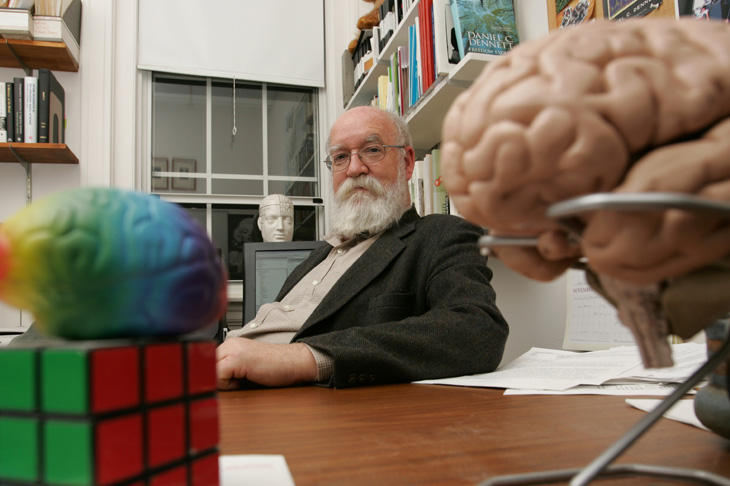The greatest of Bach’s 224 cantatas is BWV 109, ‘Ich glaube, lieber Herr, hilf meinem Unglauben’. Its subject — the title translates as Mark 9:24, ‘I believe, dear Lord, help my unbelief’ — is that strange cognitive dissonance of believing something yet not believing it at the same time. Daniel Dennett’s new book, From Bacteria to Bach and Back, is aimed at those who suffer from this intermittent unbelief, though not about God — Dennett is, after all, one of modern philosophy’s most prominent atheists — but about his specialist subject: evolution by natural selection.
Of course, most educated people nowadays accept Darwin’s great insight. But, Dennett argues in his typical avuncular style, they only do so up to a point: the point at which anyone applies it to the human mind. Even the most rational among us feel the pull of ‘Cartesian Gravity’, the force
that warps our scientific intuitions
whenever we get close to thinking about our own minds, drawing us towards dualism and other philosophically naive notions. Surely, so the faulty reasoning goes, there must be something special about our intellects that doesn’t admit of a purely Darwinian analysis?
Listen to Daniel Dennett in discussion with Sam Leith on the Spectator Books podcast:
Dennett treats this confusion with a dose of immersion therapy, applying Darwinism universally and far more liberally than most would dare. He goes so far as to encourage scientists to talk about design in evolution despite the lack of a designer, to think about reasons even though there is no reasoner (Dennett calls these ‘free-floating rationales’), and to consider ‘competence without comprehension’: like a computer, evolution can perform tasks competently, but without any need to understand what it has done.
This uncompromising adaptationism — treating no feature of life as immune to evolutionary logic — leads Dennett on to his Darwinian theory of human culture. Over thousands of years, culture has moved from bottom-up to top-down; from the mindless generating and testing of multiple ideas — some of which happened to be successful and were thus replicated, often uncomprehendingly, by other people — to the mindful, directed design we see in art, architecture, science and music. Similar to Dennett’s notion of free will, expounded in his book Freedom Evolves, culture exists on a continuum of complexity; in a strangely satisfying inversion, as culture has evolved via Darwinian processes, it has effectively ‘de-Darwinised’ itself (though not completely: even the greatest designers like Bach didn’t create ex nihilo, often going through immense — Dennett would say evolutionary — drudgery, trial and error before their masterpieces emerged).
Can culture really be unconscious? This is where memes come in. By this I don’t just mean those pictures of cats and frogs on the internet — although those are memes in Dennett’s conception. For Dennett, a meme is essentially any piece of information that spreads from person to person: indeed, even individual words are memes, and (by analogy with genes) we can study their ‘fitness’by seeing whether they ‘reproduce’ themselves into different people’s minds (again, often without those people making any conscious effort). This might seem like mission creep: Richard Dawkins’s original conception of memes included fads, chain letters and other viral phenomena, not language itself. But Dennett extends memes along another continuum, from single words all the way to the complex cultural ideas that have shaped civilisation by infesting our minds. Memes are the handholds on the climbing wall of culture, allowing us to move towards ever more purposeful, ever more conscious design.
Dennett is well aware of the scepticism that the idea of memes engenders. Indeed, he spends a chapter fending off the various criticisms that have accumulated over the decades since Dawkins suggested it. Perhaps ironically given its focus on virality, ‘memetics’ has never really caught on as a science, and I rather doubt whether Dennett’s case here will convince the non-believers. I found myself wondering what a would-be memeticist would do with their day. Which scientific hypotheses would they be testing? Where would they gather their data? How would they analyse it? The meme’s-eye-view is an intriguing perspective on cultural evolution, but the concept seems too woolly to inspire hard science (history bears out this concern: the Journal of Memetics, which had its first issue in 1997, closed down in 2005 for want of research papers).
From Bacteria to Bach and Back is one long argument, employing Darwinian logic with often counterintuitive results. Decades of developing his theory has allowed Dennett to anticipate most of the objections readers might have, and he works methodically to defuse their concerns. Those who stick with him will find the book’s ‘strange inversions of reasoning’ beguiling and its vast scope enthralling, even if they’re less than compelled by its payoff. Ultimately, philosophical thought experiments aren’t enough to buttress Dennett’s memetic view of life and culture: perhaps I’m still suffering the ill effects of Cartesian Gravity, but a little more empirical evidence would have helped my unbelief.






Comments